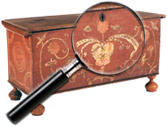|
|
Clarice Cliff (1899-1972)
Colorful & Quirky Ceramics
The Newport Pottery Bizarre Girls created bold Art Deco ware. Clarice Cliff’s hugely popular Art Deco era pottery features simple, streamlined forms decorated in brilliant colors and eye-catching patterns.
Clarice Cliff, one of eight children in a pottery making family grew up in the heart of Staffordshire pottery country in England. By the age of 17 she was working as a decorator at Wilkinson’s Royal Pottery where [...] Click here to continue reading.
Apocryphal – Definition
Apocryphal, the adjective form, means “of doubtful authenticity,” according to Merriam-Webster’s online dictionary. Apocrypha, the noun form, means “writings or statements of dubious authenticity,” again according to Merriam-Webster.
Apocrypha is actually a Greek word that means something closer to “obscure” or “hidden away.” The original meaning of the word, the Apocrypha in the proper noun sense, refers to religious texts outside of the traditional or accepted religious canon. Through connection with [...] Click here to continue reading.
Ormolu
Ormolu, an 18th-century English term, is from the French phrase or moulu, with “or” indicating gold and “moulu” being a form of an old French verb moudre, which means “to grind up.” (This French term for this technique is bronze dore.) This idea of “ground-up gold”refers to the production process of ormolu, where high-quality gold is finely powdered and added to a mercury mixture and applied to a bronze object. Modern usage often [...] Click here to continue reading.
Hoosier and the Hoosier Group
The word “Hoosier” is one of those words whose origins are lost to time. Even The Oxford English Dictionary offers no real guidance about where the word came from. What we do know is that “Hoosier” was first documented in the mid-1820s, and within a decade, it had entered general usage. John Finley, a Hoosier himself from Richmond, write a poem titled, “The Hoosier’s Nest” that was published in [...] Click here to continue reading.
Sitting Bull, Sioux Chief (circa 1831 to 1890)
Sitting Bull, the man who would later become the Hunkpapa Sioux chief, was born in South Dakota, near the Grand River. His Lakota name was Tatanka-Iyotanka. In his thirties, he began to build his reputation as a warrior, leading war parties in Red Cloud’s War against a number of Dakota Territory forts. Although the U.S. negotiated with the Sioux in order to end the war and [...] Click here to continue reading.
Hires Root Beer
While traveling in 1875, Charles E. Hires, a Philadelphia pharmacist, first tasted root beer. Root beer, traditionally made with sassafras, was a popular “small beer” or low-alcoholic drink in the colonial era, and was becoming popular in an alcohol-free format. While root beer has a long history, it has a wide range of recipes that call for everything from birch bark to vanilla, molasses to juniper berries, so Hires set out [...] Click here to continue reading.
The Battleship Maine
Construction of the U.S.S. Maine was authorized in August of 1886, and she was launched in 1889 and commissioned in 1895. After several years spent patrolling the East Coast and Caribbean, orders sent the Maine and her crew to Cuba in response to continued civil unrest on the island.
The photograph above is a 1896 image of the ship framed in a sheet iron frame made from remnants of [...] Click here to continue reading.
Mills Restaurants, Ohio
J. O. Mills, a native of Marysville, Ohio, found very little good, home cooked food while on the road in his early career as a traveling salesman. To meet that need, and utilizing his background in hotel and restaurant accounting. Mills opened a small restaurant in I 915 in Columbus, Ohio, and put into practice his primary concept ‘good food at a moderate price’. The popularity of this restaurant led him [...] Click here to continue reading.
RumRill Pottery
While not as famous as the Roseville, McCoy, or Hill potteries, perhaps due to its shorter lifespan, RumRill Pottery still played an interesting role in the rich history of Ohio potteries that sprung up during the late 19th and early 20th centuries and has a story filled with twists and turns.
In 1930, George Rumrill, a Texan with a flair for sales, started a company in Arkansas to sell various art [...] Click here to continue reading.
Canning Jars
Canning jars, also called fruit jars, because early versions were primarily used for fruit, or Mason jars, after the best-known manufacturer, are one of those technological advances that have become so ubiquitous we’ve forgotten just how revolutionary the development of food preservation really was. Many of the greatest empires, events and discoveries of the 19th century were largely aided by the development of the canning process. Supplying armies, expeditions and explorations was [...] Click here to continue reading.
|
Recent Articles
- Charles Alfred Meurer – American Artist & Tromp L’Oeil Artist
- Sendak, Maurice – American Artist & Writer
- Godie, Lee – American Artist
- Davis, Vestie – American Artist
- Bartlett, Morton – American Artist
- Mackintosh, Dwight – American Artist
- Evans, Minnie Jones – African-American Artist
- Mumma, Ed (Mr. Eddy) – American Artist
- Nice, Don – American Artist
- Savitsky, John (Jack) – American Artist
- Gordon, Harold Theodore (Ted) – American Artist
- Dial, Thornton – African-American Artist
- Doyle Sam – American Artist
- Johnson, Lester Frederick – American Artist
- Finster, Howard – American Artist
|
|
